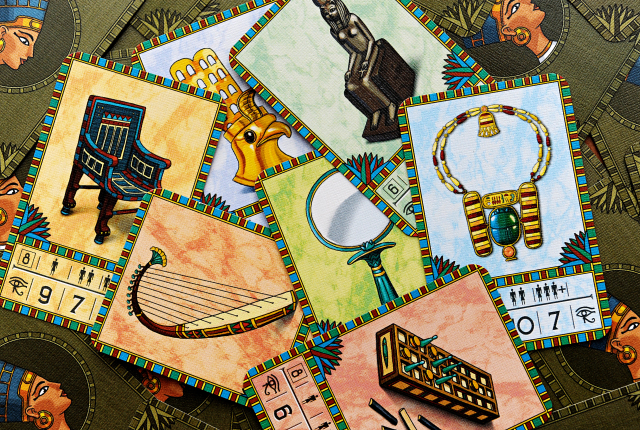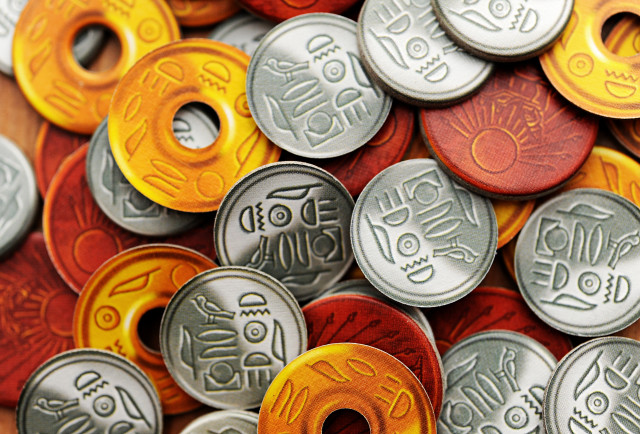It’s 1340 BC and the mighty Akhenaten rules over all of Egypt, but as often is the case when one has a busy schedule, he has forgotten his anniversary to his wife Nefertiti. Now in a panic he’s sending 3-4 of his most trusted advisors to the surrounding markets to come up with a present worthy of a queen…remember this is before the days of gas station bouquets.
In Nefertiti you work to collect the most valuable, and more importantly, the most unique gifts for the beautiful Egyptian leader. It’s got a bit of worker placement to it and a mix of bidding and auction as well. Nefertiti plays in less than an hour and the parameters of the auctions continue to change throughout the game, keeping it feeling fresh for the entire time.

On a turn you will place one of your advisors into one of the three open markets in play. This may cause a market to close and gives players the chance to pick up gifts in the form of cards. There are seven different types of gifts and they range in value and rarity. No one wants to show up at the party with the same gift as someone else (how gauche), so the value of say my golden bird head gift is 14 if I’m the only one to present it, 10 if there is another advisor who has retrieved one and only 7 if three or more have that gift at the time of scoring.
If you have bid the most in a market when it closes then you must pay the full amount of your bid or be shamed by losing a card if you can’t afford to do so. Each successive bidder may either pay the price of their bid or take half (rounded up) of the money left in the market. This can be an important decision as Nefertiti has a closed economy. Debens can be hard to come by.
Each market is made up of four randomly placed gift cards. One which will come with a royal seal attached to it to be saved for points at the end of the game or cashed in to hire characters. The person who bid the highest for gets their choice of two cards on the bottom row or the top card that comes with the royal seal. The markets get resolved in descending bidding order and then are closed, opening up another market with more fabulous gifts to bid on.
Each market has its own closing conditions and two different sides. Only one side of the market is open at a time. Once it closes the auction will occur and then the other side of the market will open for future bidding. For example, on one side Giza will close when four advisors are bid in adjacent spots. On the other side it will be closed when either three different coloured advisors have been placed there or any four. In Luxor the market will close if the spaces filled by advisors match the numbers rolled on two dice or on the other side, if a single rolled die is the same or lower than the number of advisors in the market.

These changing conditions keep you on your toes and constantly assessing the value of the cards up for auction and what you’re going to have to pay to get them.
At the end of the game you’ll score points for the gifts you’ve acquired, Debens and royal seals. However it may be worth your while to spend those seals during the game and hire a character that can make you a lot more points. The characters all have a special one-time use ability. Many of those abilities allow you to score out gifts immediately. This is awesome if you can score out a gift before anyone else has had a chance to collect one. Other characters allow you to swap cards with opponents, steal money from the markets and force discards of a type of gift. It’s often way more valuable to hire a character than to hold onto to it for the three points it provides at the end of the game, but that decision is totally situational.
Nefertiti is a pretty brilliant take on the auction game. Jacques Bariot, Thomas Cauet and Guillaume Montiage have made a hidden gem that is well worth checking out.
Comments
No comments yet! Be the first!